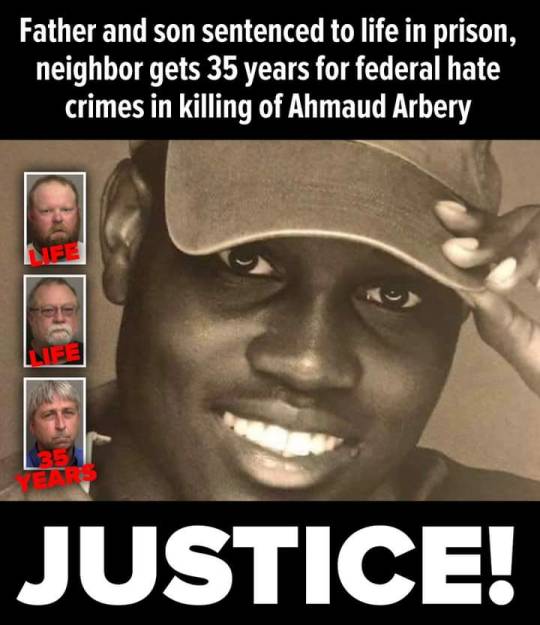#justice for ahmaud
Text
Gregory and Travis McMichael, the White father and son convicted in the killing of Ahmaud Arbery, were sentenced Monday to life in prison for their federal convictions on interference with rights -- a hate crime -- along with attempted kidnapping and weapon use charges.
Their neighbor William "Roddie" Bryan Jr., the third man involved in Arbery's killing, was sentenced by US District Court Judge Lisa Godbey Wood to 35 years, which will be served at the same time as his state sentence.
All three men already are serving life sentences for their convictions in state court on a series of charges related to the killing of the 25-year-old Black man, including felony murder.
They will be remanded to state custody to begin their sentences, the Judge ruled. Their attorneys had argued they should serve their terms in federal prison.
"I'm very relived, I'm glad, I'm thankful," Arbery's mother, Wanda Cooper-Jones, said after court. "I want to say thank you to each and every one of you who stood with us through this long process."
During their victim impact statements, Cooper-Jones and other members of the family asked the Judge to give the defendants the maximum possible sentence under federal guidelines.
"Your honor," Cooper-Jones said, "I feel every shot that was fired every day."
Travis McMichael, his father and Bryan were found guilty of the federal charges in February, with the jury accepting prosecutors' argument the defendants acted out of racial animus toward Arbery.
"The Justice Department's prosecution of this case and the court's sentences today make clear that hate crimes have no place in our country, and that the Department will be unrelenting in our efforts to hold accountable those who perpetrate them," Attorney General Merrick Garland said. "Protecting civil rights and combating white supremacist violence was a founding purpose of the Justice Department, and one that we will continue to pursue with the urgency it demands."
Travis McMichael, who fatally shot Arbery, was also found guilty of using and carrying a Remington shotgun while his father, Gregory McMichael was found guilty of using and carrying a .357 Magnum revolver.
Travis McMichael and Gregory McMichael were also sentenced Monday to 20 years on the attempted kidnapping charges, to be served concurrently with their state sentences, Godbey Wood ruled Monday.
Travis McMichael also received an additional 10 years for the weapons charge to be served consecutively, while Gregory McMichael received an additional seven years on the weapons charge, which will also be served consecutively. The judge ruled both McMichaels did not have the funds to pay a fine.
The judge noted that Bryan, who recorded the shooting and notified police of the video, should be distinguished from the McMichaels. Bryan was not armed while the McMichaels were.
"To give you a life sentence would be to not distinguish you at all from the McMichaels," she said, adding that Bryan still deserved a long sentence. She noted he would be 90 when his federal sentence ends.
The sentencing of both McMichaels were preceded by emotional testimony from Arbery's family, which told the court about how his killing had impacted them and changed their family.
They also condemned the actions of both men, with Cooper-Jones testifying to her confusion when she learned Gregory McMichael was with Travis when he killed Arbery. At first, she said, she questioned whether that could be true.
"I struggled to come to the realization that a father would actually accompany his son to take a life," she said. "I didn't want to believe that, because me as a mother, I could never accompany my son to do any type of crime."
Before Gregory McMichael was sentenced, he acknowledged Arbery's family, who were in court, saying the "loss that you've endured is beyond description. There's no words for it."
"I'm sure that my words mean little to you, but I wanted to assure you I never wanted any of this to happen. There was no malice in my heart or my son's heart that day," he said.
Gregory McMichael also apologized to his wife and his son, saying, "I should have never put him in that situation."
"Finally, I pray that God's peace will come to the Arbery family and this community," Gregory McMichael said.
Cooper-Jones told CNN's Sara Sidner that while she accepted the apology, "I did not forgive him for what he did."
She said she thought he had a lot to think about while he's been in jail for the past two-plus years.
"He's come to terms with he made a very bad decision, and he wanted to say he was sorry," she told CNN. "So I did accept it, but as far as forgiving, I haven't forgave him."
Bryan later issued a similar apology, but Arbery's father, Marcus Arbery Sr., dismissed Bryan's words.
"When this first happened, he should have shown some kind of remorse then," Arbery said. "When you get caught up and it's looking bad for you, that's when you're trying to apologize. That's a bad time to apologize. He should have did that day one."
Attorney Ben Crump, who represents the Arbery family, said he hopes it is a "turning point in the civil rights movement."
"This sentence sends a message that vigilantes cannot hunt down and kill an innocent Black man, putting themselves in the roles of police, judge and executioner, without paying a high price," he said in a statement.
JUDGE DENIES MCMICHAELS' REQUESTS TO REMAIN IN FEDERAL CUSTODY
Arbery's killing, months before the police killing of George Floyd in Minneapolis, was in some ways a harbinger of the nationwide protests that erupted that summer as demonstrators decried how people of color sometimes are treated by law enforcement.
Travis McMichael's Attorney Amy Lee Copeland argued Monday for her client to remain in federal custody and to serve out his prison term with the Federal Bureau of Prisons rather than the Georgia Department of Corrections.
Travis McMichael fears for his life in a state prison, Copeland said, telling the court his client had received "hundreds" of threats. Forcing him to serve the time in a Georgia state prison would essentially amount to a "backdoor death penalty" that could leave McMichael vulnerable to "vigilante justice," she argued, acknowledging the "rich irony."
Gregory McMichael's attorney made a similar request, but argued the 66-year-old should be kept in federal custody for his health.
Prosecutors opposed both requests. In cases in which a defendant faces charges in separate jurisdictions, they argued, the one that issues its sentence first takes precedence.
The Judge agreed and denied the requests, telling Travis McMichael she had "neither the authority nor the inclination" to override the rules.
To make their case, federal prosecutors focused on how each defendant had spoken about Black people in public and in private, using inflammatory, derogatory and racist language.
Prosecutors and Arbery's family had said he was out for a jog -- a common pastime for the former high school football player -- on February 23, 2020, when the defendants chased and killed him in their neighborhood outside Brunswick, Georgia.
Defense attorneys argued the McMichaels pursued Arbery in a pickup through neighborhood streets to stop him for police, believing he matched the description of someone captured in footage recorded at a home under construction. Prosecutors acknowledged Arbery had entered the home in the past, but he never took anything.
The defense also argued Travis McMichael shot Arbery in self-defense as they wrestled over McMichael's shotgun. Bryan joined the pursuit in his own truck after seeing the McMichaels follow Arbery in their pickup as he ran.
Two prosecutors initially instructed Glynn County police not to make arrests, and the defendants weren't arrested for more than two months -- and only after Bryan's video of the killing surfaced, sparking the nationwide outcry.
#us politics#news#gregory mcmichael#travis mcmichael#2022#2021#federal hate crime#murder#justice for ahmaud#ahmaud arbery#cnn#Judge Lisa Godbey Wood#Wanda Cooper-Jones#Marcus Arbery Sr.#ag merrick garland#merrick garland#department of justice#william 'roddie' bryan jr.
17 notes
·
View notes
Text
Apple Adds $25 Million to Racial Equity and Justice Initiative, Increasing Financial Commitment to over $200M since 2020
This week, Apple announced its Racial Equity and Justice Initiative (REJI), a long-term global effort to advance equity and expand opportunities for Black, Hispanic/Latinx, and Indigenous communities, has more than doubled its initial financial commitment to total more than $200 million over the last three years.
Since launching REJI in June 2020, Apple has supported education, economic…

View On WordPress
#Ahmaud Arbery#and criminal justice reform#Anti-Recidivism Coalition#Apple#Breonna Taylor#Defy Ventures#Delgado Community College#economic empowerment#Education#George Floyd#HBCUS#Hispanic-Serving Institutions#Houston Community College#HSIs#Los Angeles Community College District#My Brother’s Keeper Alliance (MBKA)#Obama Foundation#Racial Equity and Justice Initiative (REJI)#The Last Mile#Tim Cook#Vera Institute of Justice
16 notes
·
View notes
Text

#grafitti#street art#graffittiart#street photography#graffiti#graphic art#aesthetic#counterculture#seattle#blm#george floyd#breonna taylor#justice for breonna#ahmaud arbery#cat#poster art#protest
2 notes
·
View notes
Text
Some more good news

Gregory and Travis McMichael, the White father and son convicted in the killing of Ahmaud Arbery, were sentenced Monday to life in prison for their federal convictions on interference with rights -- a hate crime -- along with attempted kidnapping and weapon use charges.
Their neighbor William "Roddie" Bryan Jr., the third man involved in Arbery's killing, was sentenced by US District Court Judge Lisa Godbey Wood to 35 years, which will be served at the same time as his state sentence.
All three men already are serving life sentences for their convictions in state court on a series of charges related to the killing of the 25-year-old Black man, including felony murder.
How can people live with this much hate in their hearts?
It's been over two years since Ahmaud was murdered and I still don't have a clear answer. 💔
#say his name#running while black#georgia#hate crime#ahmaud arbery#justice#but it won't bring him back#2022#being black is not a crime#humanize being black
17 notes
·
View notes
Text
Ahmaud Arbery’s Hometown Renames Street To Honor Him
The hometown of Ahmaud Arbery unveils new street signs honoring him. The town of Brunswick, Georgia, renamed a section of road that runs through the city’s Black community to honor Arbery, the young Black man who was fatally shot in 2020 after being chased by three white men.
At a celebration attended by dozens of residents including Arbery’s parents, the first two signs recognizing Honorary Ahmaud Arbery Street were unveiled as the crowd chanted “Long live Ahmaud Arbery!” Brunswick commissioners voted to rename the street with a resolution proclaiming he’d become “a symbol of strength and unity within our community.”
Arbery’s mother, Wanda Cooper-Jones says the moment was bittersweet. She still mourns her son’s death, but is proud of all that’s been accomplished in his name. Since his Feburary 2020 murder, additional penalties for crimes motivated by race, religion, sexual orientation or other factors have been adopted and a century-old law allowing citizen arrests has been gutted. She hopes the street renaming will help keep her son’s memory alive. “Please promise me you guys will always say his name,” she says.
Source: NBC News
Photo credit: Bubba73 / Wikimedia Commons
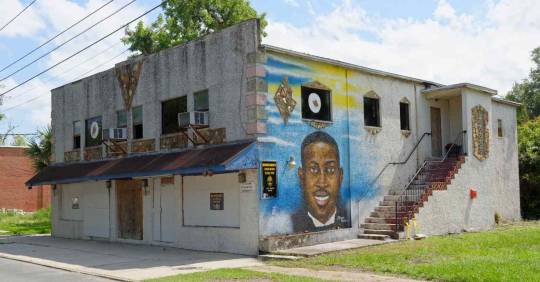
#Good News#GoodNews#Brunswick#Georgia#Racial Justice#Black Live Matter#Honorary#Ahmaud Arbery#Community
15 notes
·
View notes
Text
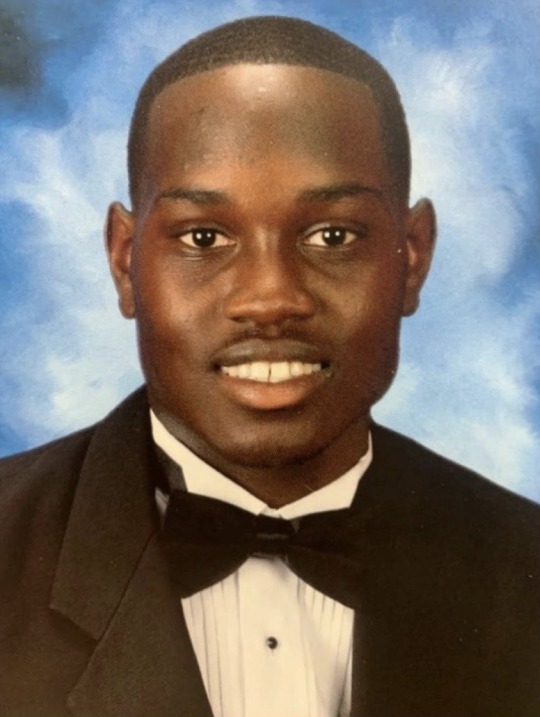

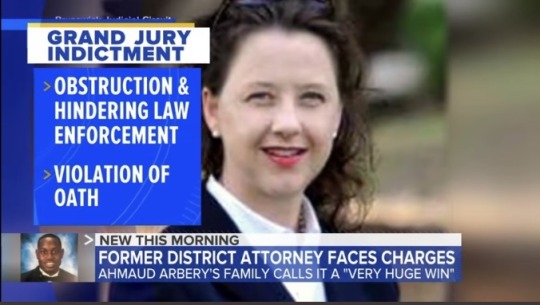
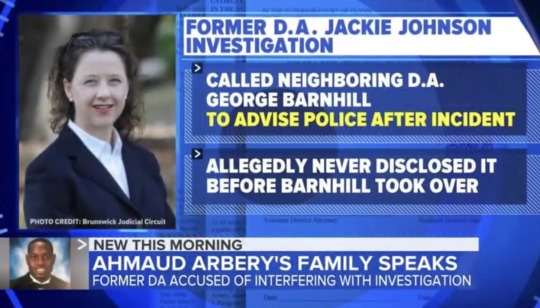


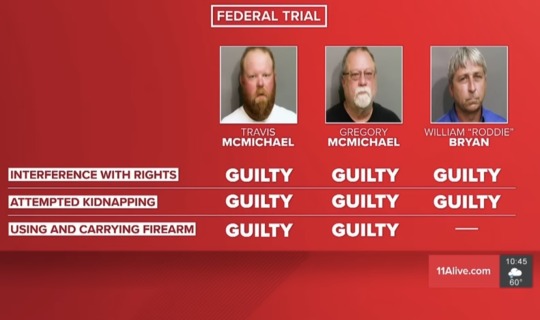
#ahmaud arbery#justice for Ahmaud Arbery#Jackie Johnson former da#George barnhill#10 unnamed officers#Jackie Johnson arraignment hearing delayed#say their names#black lives matter#federal law#state law#accountability
2 notes
·
View notes
Text

we got justice LET'S GOOOOOOOOOOOOOOOOOOOOOOOOOOOOOOOOOOOOOOOOOOOOOOOOOOOOOOOOOOOOOOOOOOOOOOOOOOOOOOOOO
4 notes
·
View notes
Text
Justice for Ahmaud Arbery.

2 notes
·
View notes
Photo
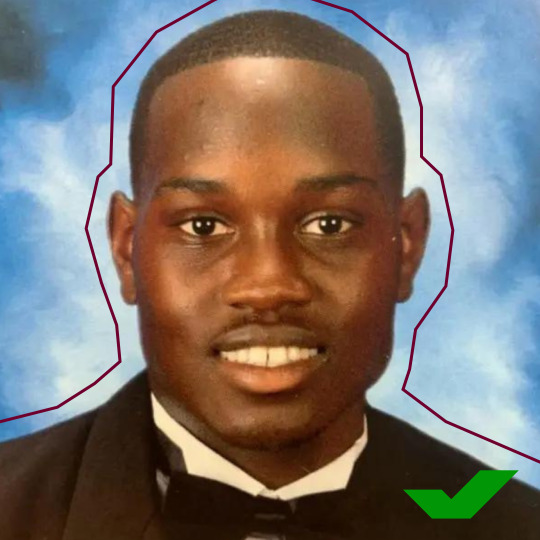

Four years ago today, Ahmaud Arbery was chased and killed by three white men while jogging in a Georgia residential neighborhood.
Ahmaud’s killers were convicted of murder and federal hate crimes one year later after Georgia passed a hate crime bill with bipartisan support.
While this legislation was a step in the right direction, true justice would be Ahmaud still living today. His life mattered.
355 notes
·
View notes
Text
KANSAS CITY, MO – Ralph Yarl, a 16 year old Black boy, was shot twice by a white man in North Kansas City after accidentally ringing the doorbell of the wrong home while attempting to pick up his sibling. The white man reportedly shot Ralph in the head through the glass door, then when Yarl was already bleeding out on the ground, shot him again. The family has described it as a hate crime, and community members are calling for justice for the young victim.
“This was not an ‘error’; this was a hate crime. You don’t shoot a child in the head because he rang your doorbell. The fact that the police said it was an ‘error’ is why America is the way it is,” said Dr. Faith Spoonmore, the aunt of Ralph Yarl.
Reports indicate that the white man was taken to the police headquarters briefly to provide a statement but was released shortly after without charge. Yarl’s family is outraged that the perpetrator has not been held accountable.
According to Dr. Spoonmore, “This man intended to kill an innocent child simply because he rang the doorbell of the wrong house. He looked him in the face and shot him… and the individual is free to go about his day as if he did a great deed. While my nephew Ralph Yarl is a great kid, an intelligent kid, a black boy is left with so many broken pieces.”
Lee Merritt, a nationally recognized civil rights lawyer who has represented Ahmaud Arbery and Cameron Lamb, has taken up the case. Shaun King, a well-known activist and journalist, is also assisting with the case. Since the story was first reported by The Kansas City Defender yesterday, it has gone viral across social media platforms, reaching millions of people.
A protest is scheduled for today as community members continue to demand justice for Ralph Yarl. The Yarl family is urging supporters to help spread awareness about the case and bring attention to the issue of racial violence in America.
This is a developing story and more updates will be provided as they become available.
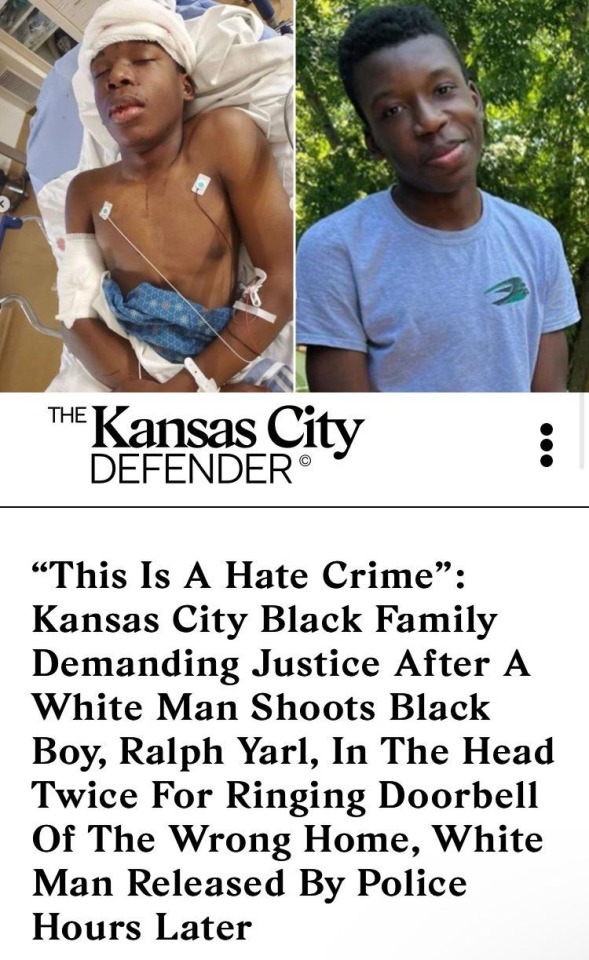
294 notes
·
View notes
Text
ART: Marlon West's Ink Tributes to Real Life Heroes Debuts at Museum of Social Justice in Los Angeles on 8/13
ART: Marlon West’s Ink Tributes to Real Life Heroes Debuts at Museum of Social Justice in Los Angeles on 8/13
by Lori Lakin Hutcherson (@lakinhutcherson)
Disney VFX Supervisor Marlon West (Iwájú, Princess and The Frog, Moana, Frozen) will have his own art on display in an exhibition that debuts at the Museum of Social Justice in Los Angeles on August 13.
Since 2020, West has been drawing and posting ink tributes on his social media of African-American people slain by police or targeted by racists,…

View On WordPress
#Ahmaud Arbery#Breonna Taylor#George Floyd#Marlon West#Michael Brown#Museum of Social Justice#Sandra Bland
5 notes
·
View notes
Text
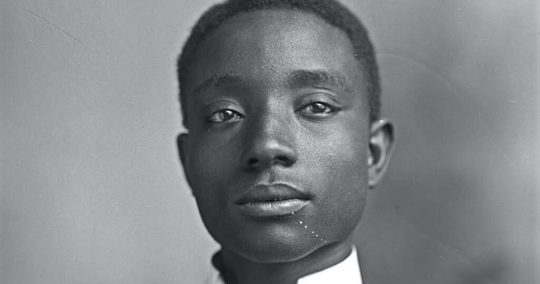
Freedmen Seek Their Fair Share of Billions of Dollars in Federal Aid and Why We Should Care/Rise UP and Support Them
By Eli Grayson
Eagle Guest Writer
Eli Grayson is a Creek Citizen and unabashed supporter of the Freedmen descendants of the 5 Civilized Tribes and the 1866 Reconstruction Treaties.
This past week, we celebrated our Nation’s 244th year of Independence with family and friends over BBQ and fireworks, we should all stop to reflect on its significance, particularly in light of the Black Lives Matter (BLM) movement.
The protests that have swept the country by those outraged over the death of George Floyd, Breonna Taylor, Ahmaud Arbery, and far too many others, most of whose names have not garnered national attention, has sparked a long-overdue National dialogue about the treatment of Black Americans in the United States, a reckoning with this country’s past, the many vestiges of slavery that continue today, and what we as a country can and must do to address racism. [It also reminds ALL of us that we have a long way to go.]
Not only have the egregious deaths of George Floyd, Breonna Taylor, and Ahmaud Arbery led to a growing chorus of voices calling for criminal justice reform, it has prompted many to reflect upon racism in both its subtle and overt forms today. It has prompted many to learn about events long celebrated by Black Americans such as Juneteenth (even the NFL recently recognized Juneteenth as an official holiday). And it has prompted many to consider what steps we as individuals, and as a society, can take to affirmatively address it. Here in Oklahoma, attention has focused on Black Wall Street and the 1921 Tulsa Race Massacre.
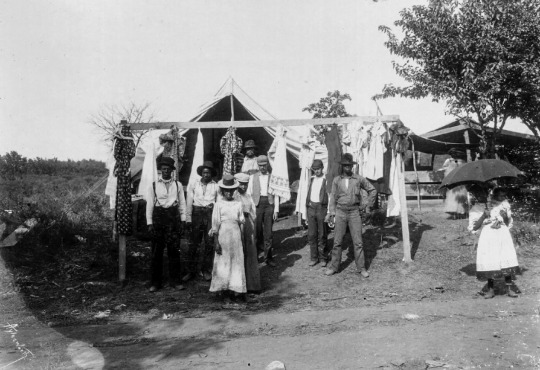
Well known is the U.S. Government’s abhorrent treatment of Native Americans, which included abrogation of countless treaties, appropriation of land, and forced removal to Western territories, including what is today Oklahoma.
Less well known, however, is the fact that the Cherokee, Chickasaw, Choctaw, Muscogee (Creek) and Seminole Nations – collectively known today as the Five Civilized Tribes – enslaved Africans. Like Southern plantation owners, they bought and sold slaves and treated them as chattel property. Indeed, slaveholding was such an integral part of the daily life of these tribal nations that each entered treaties with the Confederate States of America in 1861 to ensure its continuance.
Many Americans recently learned for the first time about the meaning and significance of Juneteenth, when nearly all remaining slaves in the United States and its territories were freed – a full 71 days after Confederate General Robert E. Lee surrendered at Appomattox on April 9, 1865 to Union forces led by General Ulysses S. Grant.
Enslaved Africans of Indian Territory
This was not the case for the enslaved Africans of Indian Territory. Even after Lee’s surrender, and even after General Granger read his Orders, the enslaved Africans of Indian Territory were kept in bondage.
Sadly, it was not until the Five Tribes of Indian Territory entered Treaties with the U.S. Government on March 21, with the Seminole Nation, on April 28, with the Chickasaw and Choctaw Nations, on June 14, with the Muscogee (Creek) Nation and on July 19, with the Cherokee Nation in 1866 – more than a year after Lee’s surrender – were these slaves granted freedom, tribal citizenship, and equal interest in the soil and national funds.
Each of these treaties (collectively known as the Treaties of 1866) contained provisions freeing the slaves and an express acknowledgement that the U.S. Constitution was, and shall remain, the Supreme Law of the land. Notably, there was no mention of tribal law or sovereignty insulating these slave holding tribes from full compliance with the U.S. Constitution, which includes all the Civil War reconstruction amendments.
Today, we find ourselves at a turning point in society. Similar to the country as a whole, the Cherokee, Chickasaw, Choctaw, Muscogee (Creek), and Seminole Nations must take this seminal moment to carefully examine their slaveholding past, their prior allegiance with the Confederacy, enshrined through Treaties entered in 1861, and how they can make amends by fully adhering to both the letter and spirit of the 1866 Reconstruction Peace Treaties.
Congressional legislation
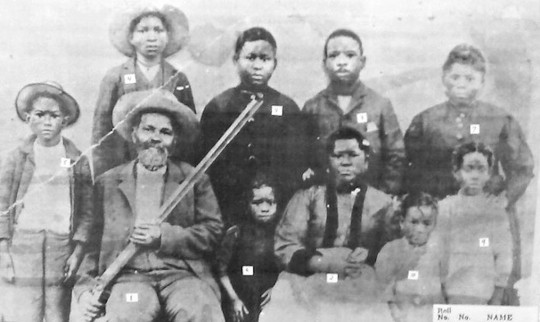
The three House bills are H.R. 2, the Invest in America Act, which includes $1 billion for the Native American Housing Block Grant Program to create or rehabilitate over 8,000 affordable homes for Native Americans on tribal lands; H.R. 6800, the HEROES Act, which includes $6 billion for housing and community development to respond to the Coronavirus; and H.R. 5319, the Native American Housing and Self-Determination Reauthorization Act (NAHASDA), which would authorize $680 million in grants to tribes in the first year and grow to $824 million in the fifth and final year.
Why is this important and why should you care? NAHASDA was originally passed by Congress in 1996 to address poor housing conditions in Indian country and last re-authorized in 2008. It is a flagship Federal law for Native American tribes and the vehicle through which approximately $650 million flows annually to the tribes. In Oklahoma, the Five Civilized Tribes receive more than $62 million annually in direct grants for housing and community development projects. These grants are based on a formula that takes into account various factors including the number of tribal members. Notably, these grants are supported by taxpayers.
For the 2021 Fiscal Year, the U.S. Department of Housing and Urban Development (HUD), which is responsible for administering NAHASDA, has informed the Five Civilized Tribes that they can expect to receive $62,223,462. Thus, nearly 10 percent of all NAHASDA grant funds will go to just these five tribes. By any measure, this is a significant sum, particularly when you consider that there are approximately 573 federally recognized tribes in the United States today, according to data from the federal Bureau of Indian Affairs. And, the final amount will be even greater as Congress has (appropriately) increased the amount of funds for NAHASDA far above the amounts requested by this Administration, including an appropriation of $825 million for this Fiscal Year.
Oklahoma Tribes receive millions in housing aid
Native American Tribes also receive other competitively awarded grants from HUD through a program known as the Indian Community Development Block Grant program. The Choctaw Nation was recently awarded $900,000 to rehabilitate 60 single-family homes while the Cherokee Nation received the same sum to construct a community building, which will house the Early Head Start program. The Chickasaw Nation was awarded $900,000 to construct a youth center in Ardmore, Oklahoma that will provide a safe and clean place for activities and services for Chickasaw tribal youth while the Muscogee (Creek) Nation will use its $900,000 award to construct a facility on the campus of the College of Muscogee Nation. The facility will include space for exhibitions and a lecture hall. These are worthy projects and it is vital that all those in need, including Freedmen descendants, can benefit.
Why Freedmen are concerned
Now if you have read this far, you must be thinking this is great news for these five tribes. And indeed, it is. However, for the Freedmen who are de facto members of the tribe, they may never see a dime of these funds if history is any guide.
Steps such as conditioning or denying the issuance of Citizenship Cards to Freedmen descendants, as well the disenrollment of Freedmen as tribal citizens, is what first led Congress in 2008 to include language in the NAHASDA re-authorization bill to link the receipt of NAHASDA housing grants to compliance with the treaty rights and benefits conferred on the Freedmen through the 1866 treaties.
That is why the efforts of House Financial Services Committee Chairwoman Maxine Waters, D-California, to fight on behalf of the Freedmen of all Five Civilized Tribes is so vital.
The committee she chairs oversees HUD and is responsible for periodically re-authorizing NAHASDA. A bi-partisan bill introduced in Congress last December would re-authorize NAHASDA. However, unlike the 2008 legislation, which contained language to prevent the Cherokee Nation from denying Cherokee Freedmen under the Act, the bill introduced by Rep. Denny Heck and co-sponsored by Reps. Scott Tipton (R-Colorado), Ben Ray Lujan (D-New Mexico), Tom Cole (R-Oklahoma), Deb Haaland (D- New Mexico), Don Young (R-Arkansas), Rep. Gwen Moore (D-Wisconsin), and Rep. Tulsi Gabbard (D-Hawaii), does not contain any protections for the Cherokee Freedmen nor the Freedmen of the other Civilized Tribes. Similarly, the version introduced in the Senate last week is devoid of such protections for the Freedmen.
Disturbed by the pattern of denying benefits to Freedmen, Chairwoman Waters is seeking assurance that descendants of Freedmen are not denied NAHASDA funds received by the Tribes. The Descendants of the Freedmen of the Five Civilized Tribes have been working to include language that would ensure that the Freedmen of all Five Civilized Tribes receive taxpayer funded NAHASDA benefits. A similar effort advanced by former House Financial Services Committee Chairman Barney Frank was successful and helped to ensure that Cherokee Freedmen received NAHASDA benefits. And in case, any question whether such protections were needed, one look only to the fact that HUD held up NAHASDA funds to the Cherokee Nation for noncompliance.
Native Americans keep fight against Freedmen
Given the harsh treatment of Native Americans at the hands of whites, one naturally would expect these Five Tribes and their supporters and defenders to be more sensitive to the plight of Freedmen who today make up more than 200,000 descendants.
The reality has been quite the opposite.
Despite knowing all this, tribal leaders and their supporters and defenders continue to maintain that such language is not needed and further argue that such language infringes upon the sovereign rights of ALL Native American tribes.
Both arguments could not be further from the truth.
Language ensuring that the Freedmen have access to federal housing benefits is urgently needed for the very reason that Freedmen have routinely been denied NAHASDA benefits for years. And let’s be clear – language we are seeking does not apply to ALL tribes, but rather only to the Freedmen of the Five Civilized Tribes.
And it does not stop at NAHASDA benefits. Freedmen have been denied tribal citizenship, benefits, and the right to vote as well. Regarding sovereignty, these are federal taxpayer dollars – as such, the federal government and, by extension, its American citizens, have a vested interest in ensuring that all tribal members, including Freedmen, benefit from the funds appropriated pursuant to NAHASDA.
If tribes feel so strongly about their sovereign right to continue to discriminate against Freedmen through denial of federally funded benefits, they can opt to refuse the funding, which would then be redistributed to other tribes. Indeed, it is the height of hypocrisy for any of the Five Civilized Tribes or their supporters to makes these arguments as they count the Freedmen when it comes to the allocation of federal housing grants from HUD yet turn around and deny those very same Freedmen from receiving such benefits.
Freedmen are equal, lawful Tribal citizens
And don’t be mistaken. While Freedmen should be treated as equal citizens under the respective 1866 Treaties, the language we are seeking to include in each of these three bills carefully avoids this ensuring Freedmen receive taxpayer housing and community development benefits on the same terms and conditions as their Native American sisters and brothers.
Indeed, in many instances, these truly are their sisters and brothers given the extensive intermixing of Freedmen and By Blood tribal members over the years. Ironically, this has resulted in some members of a family being considered by the Five Tribes as Indian and therefore citizens of the Tribe while other family members being considered by the tribe as non-Indian and therefore like black sheep.
Yet every time we make a further legislative concession and are led to believe that we are close to a final agreement on language, the Tribes and their supporters and defenders move the goalposts. Sound familiar? Yes, a sensitive issue. The Freedmen only seek to ensure that the Five Civilized Tribes comply with the Treaties of 1866.
Tribal Nations’ actions throw shade on BLM
Lastly, the Five Civilized tribes cannot have it both ways. They cannot on the one hand claim they are victims of discrimination and participate in BLM rallies yet discriminate against Freedmen by denying them suffrage and other rights of tribal citizenship under the guise of sovereignty.
And we are under no illusion that fighting this battle for justice and equality will not remain a challenge. The Five Civilized Tribes have wielded their extensive influence amongst the Nation’s 573 tribes to frame the debate and shape the position of the National tribal organizations in Washington, whom the Members of Congress look to when writing laws that affect the tribes. Adding to the challenge is the fact that the Five Civilized tribes have deployed their sizable resources to contribute to key Members of Congress with the dual purpose of keeping Americans in the dark about their slaveholding past and ensuring that these legal protections for Freedmen never see the light of day in Congress.
But just like our Nation, it is time for the Five Civilized Tribes to stand up and confront their past by taking immediate and affirmative steps to ensure that all descendants of Freedmen receive the federal housing benefits.
This they can do by supporting legislation being courageously advanced by Chairwoman Waters that would require the Five Civilized Tribes to both comply with their Treaty obligations of ensuring access to benefits for Freedmen and report on their compliance to Congress.
Featured Image (Top), Buck C. Franklin, Nashville, Tennessee, 1899, Calvert Brothers Studio Glass Plate Negatives Collection, The Tennessee State Library and Archives Blog
#Black Lives Matter for Freedmen Descendants of the Five Civilized Tribes#Black American Freedmen#Freedmen#indians#slavery
105 notes
·
View notes
Text
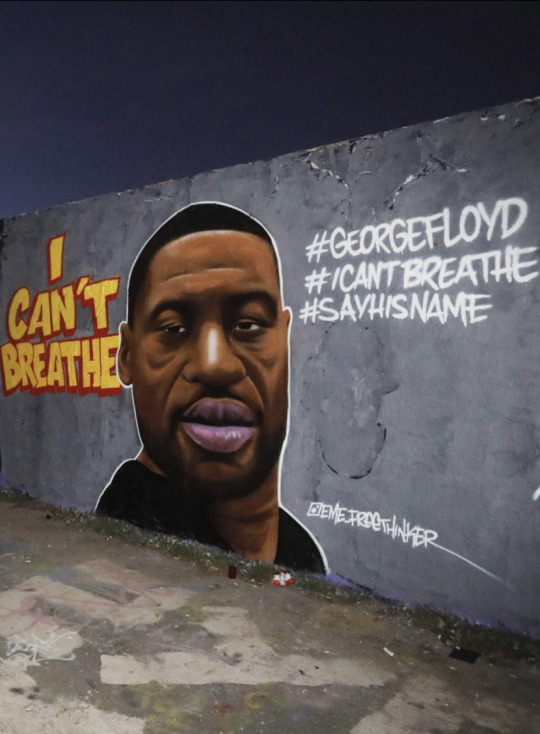
Three years have passed since Minneapolis police murdered George Floyd. While politicians encouraged protesters to seek redress through the "justice" system, nothing could bring back his life, nor the lives of Breonna Taylor, Ahmaud Arbery, or any of the other people murdered by police in a structurally racist system.
The conviction of the officers who murdered George Floyd was an exceptional case aimed chiefly at pacifying an outraged population. Over the past three years, police have continued to murder Black and Brown people at the same pace.
What will it take to stop the police from killing?
https://crimethinc.com/endpolice
This is the question we must all ask today.
178 notes
·
View notes
Text
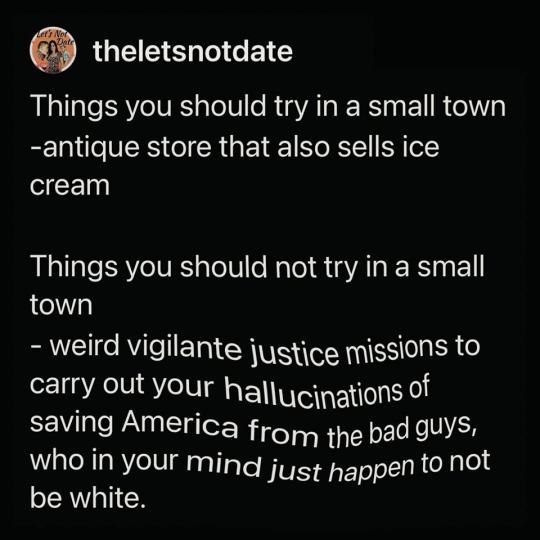
Remember Ahmaud Arbery? He was a victim of weird vigilante justice
99 notes
·
View notes
Text
THEY MUST NOT DIE: STORY OF SCOTTSBORO
On March 25th, 1931, nine Black boys in Alabama, USA were falsely charged with r*ping a White woman. They would then be sentenced to death. Labelled a legal case of lynching, this case, known as the Scottsboro Boys case, blew up across the country and the world as a major part of the early Civil Rights Struggle.
The Scottsboro Boys case was a pivotal moment in Black history in the United States that had rippling effects that would impact generations to come. The international struggle to free the Scottsboro Boys led to the largest resistance movement against racism in the US justice system in history. The international impact of the Scottsboro case was so far reaching that a Sedition Bill was passed in Ghana (then the British colony of the Gold Coast) to prevent Africans from agitating in support of the Scottsboro Boys.
While the case did officially bring about certain legal reforms to the carceral system, such as mandating the presence of Black jurors in cases with Black defendants, this would often go unenforced throughout the 20th century and into the present. In one example, Black revolutionary Assata Shakur would go on to be sentenced to life in prison by an all-White jury. In 1986, a court ruled that race could not be used as a factor in the initial establishment of a jury pool. In 2021, there were two high-profile cases in which nearly all-White juries acquitted White men for shooting and killing Black men - the murders of Jake Blake and Ahmaud Arbery.
Africans in the United States and throughout the diaspora continue to struggle against a racist criminal justice system in which they are disproportionally incarcerated.
BlackBoys #Alabama #USA #False #Charge #WhiteWoman
10 notes
·
View notes
